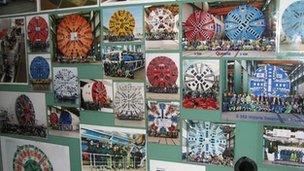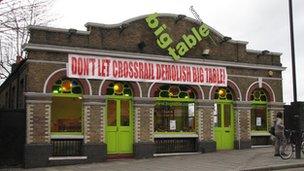Crossrail project: Digging to start on London tunnels
- Published
Richard Lister went to see Crossrail's huge tunnelling machines
They look like a movie prop from "Journey to the Centre of the Earth" but the Tunnel Boring Machines (TBMs) unveiled in Germany are the real thing.
Each one weighs 1,000 tonnes and is longer than a football pitch.
In March, the first of eight of these giant machines will start burrowing under central London to carve out the tunnels for Crossrail, Europe's biggest civil engineering project.
Crossrail will link areas east and west of London on 118km (73 miles) of rail track. The route will descend as much as 40m (130ft) under London through 21km of twin-bore tunnels.
Made in Germany
They will take two years to dig, but the preparation work is well under way.
The TBMs were built in Schwanau, Germany, by Herrenknecht. Testing has now been completed and the first is being shipped to the UK in pieces for re-assembly at the tunnel entrance site at Royal Oak in west London.
Everything about the machines is enormous, including their price tag - £10m each.
They are a suitable emblem for an enterprise which will cost £14.8bn and will employ an estimated 10,000 people. This is a project of big numbers.
When the TBMs start work, they will operate 24 hours a day, grinding through the London clay at a rate of 100m a week.
The six million tonnes of earth they will remove will be transported to Wallasea Island in Essex, where they will be used to create a new nature reserve.
Each TBM will be operated by "tunnel gangs" of 20 people working in shifts.

The TBMs are not the first to be made in Germany by Herrenknecht
Those working underground will be trained at a new Tunnelling and Underground Construction Academy at Ilford in east London.
It expects to train 3,500 people for Crossrail, and will remain in place to continue training those engaged in underground construction for other projects.
As the machine bores out the tunnel, it lines it with concrete segments. Production of those segments has just started at a purpose-built factory in west London.
Each weighs almost three-and-a-half tonnes and takes a month to set solid.
Two more factories will be built, and between them they will produce a quarter of a million concrete segments to line the Crossrail tunnels.
Crossrail says the new network will increase rail capacity to London by 10%, bringing another 1.5 million people to within 45 minutes of the capital.

Big Table has been served a compulsory purchase order
Forced out
It estimates the boost to the UK economy to be worth £42bn. But for one west London business, it means the end of the line.
Big Table, which makes beds and mattresses, has been operating from the same site for 30 years, but Crossrail has served it with a compulsory purchase order so that it can build an electricity sub-station there.
They may have to move out as early as the end of January, and cannot find new premises.
"It's bewildering," says general manager Stephen Bond.
"We tick every box. We're a local business… looking to employ young people to train them. We do everything right, but we are going to get squashed because they want to put a great big concrete box here."
The building is a local landmark in an historic building.
Julie Bundy, director of Westminster Artisans, is helping co-ordinate the campaign to save the building. She says 3,000 people have signed a petition calling on Crossrail to find another site.
"Support has been absolutely overwhelming," Ms Bundy said. "People feel very keenly that it shouldn't be demolished."
Crossrail, though, is a juggernaut that will not easily be diverted.
- Published18 November 2011
- Published19 October 2011